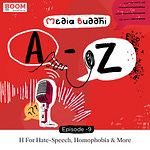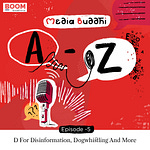Welcome to a special episode of Media Buddhi A-Z. This is a short episode in which I talk more about the need for this podcast, why it’s a podcast in the first place, and not a video-podcast or for that matter a series of articles.
My name is H R Venkatesh, and I’ve been with BOOM Fact-Check for about 3 years now and I started Media Buddhi.
I’m actually recording this back at home in New Delhi after having landed from a series of international flights, but this episode was written on those flights in the last two weeks. Basically, three of us at BOOM Fact-Check went to Oslo, Norway for Global Fact 9. It’s a fact-checking conference and we encountered some pretty interesting new ideas and we confirmed some of our own ideas about how to tackle the war on truth. And hopefully, when I said ‘confirm’ our views, hopefully there wasn’t must Confirmation Bias at play!
Then, from there, I went to Honolulu, Hawaii, for another conference, the International Media Conference by the EastWest Center, where I encountered a few more interesting ideas. Unfortunately, I caught a moderate case of Covid-19 in between and I was forced to rest there and in New York where I had to cancel a flight.
But the experience also gave me some time and space to think—away from the regular rhythms of work and life, and I’m passing some of those thoughts to you, because they’re focused on why we’re doing this podcast.
So in my first few days in Honolulu, where I was self-isolating from other people, but not necessarily stuck to my room—the University of Honolulu campus is beautiful with large canopy-like trees—I came across a book in their campus bookstore. It was half-open, they were re-organising their stuff, and I came across this book, it’s called, Call Them By Their True Names, by the writer and thinker Rebecca Solnit. It was this solitary little red book that was nestling in a stack and priced at $1, and of course, I grabbed it before anyone could see it.
Now for those of you who don’t know Media Buddhi very well, Rebecca Solnit is like a patron saint, and I think I’ve unconsciously absorbed her writings over the years, such that it led to the creation of this podcast even.
So…why this podcast? The ideas was that we must have the space to discuss truly contentious issues by taking them one word at a time. In each episode, we tackle some words starting with one letter of the alphabet. For the first episode, for the letter A, we discussed words like Authenticity, Algorithm, Appropriation, Allyship, Anonymous, and Anxiety. Some of these words seem very simple, but they are actually nuanced, and understanding them better helps us have better conversations.
For the next episode, devoted to the letter B, we discussed words like Bhakt, Bias, Bullshit or Bakwas, and Blame and more.
Now back to the book, Call Them By Their True Names by Rebecca Solnit. When I read the first few pages of her book, sitting on a bench under another large canopy tree at the University of Hawaii, I felt shockwaves. I felt like she was describing the project of this very podcast, far more eloquently, and of course, many years before we started it.
I’m going to read a few parts of this book now.
Solnit says that one of the types of stories that turn up in our folklore or myths again and again is how a mysterious or threatening person is defeated when the hero or heroine discovers his name… I’m reading verbatim from her now.
“In the deep past, people knew names had power. Some still do. Calling things by their true names cuts through the lies that excuse, buffer, muddle, disguise, avoid, or encourage inaction, indifference, obliviousness. It’s not all there is to change in the world, but it’s a key step.”
She continues:
“When the subject is grim. I think of the act of naming a diagnosis. Though not all diagnosed diseases are curable, once you know what you’re facing, you’re far better equipped to know what you can do about it. Research, support, and effective treatment, as well as possibly redefining the disease and what it means, can proceed from the first step. Once you name a disorder, you may be able to connect to the community afflicted with it, or build one. And sometimes what’s diagnosed can be cured.”
It’s just amazing that Rebecca Solnit writes these words, and she says further down in the passage,
“Naming is the first step in the process of liberation.”
I like this part: the idea of naming as a diagnosis. And naming as the first step in the process of liberation.
Think about it, words and terms like fake news were not common at all before 2016. Same with words like misinformation and disinformation — these words were used in intelligence circles and in spy novels, but they were not really mainstream. Similarly, we have so many words today that describe feelings and phenomena where there were no words before. Feminism is one, for example.
Once we got to know these words, we could start building actions and we started fact-checking for example, which is a field that pretty much sprung up overnight. That’s what I think she means when she says naming is the first step in the process of liberation.
Let me quote one last time from her:
“To name something truly is to lay bare what may be brutal or corrupt—or important or possible—and key to the work of changing the world is changing the story, the names, and inventing or popularizing new names and terms and phrases. The project of liberation has also involved coining new terms or bringing terms that were obscure into more popular use: we now talk about normalization, extractivism, unburnable carbon, about walking while Black, gaslighting, the prison-industrial complex and the new Jim Crow, affirmative consent, cisgender, concern trolling, whataboutism, the Mano sphere, and so much more.”
Now these words that we will discuss in future episodes and in the Indian context as well, there are many words that need proper explaining and examination and there are many words that need to be created, or reclaimed.
I’ll give you one more example: at the conference in Honolulu, my fellow panelists was Dr Joan Donovan, who is the Research Director at the Shorenstein Center at Harvard University. Coincidentally, she was also at the fact-checking conference in Oslo, and she made a couple of eye-popping presentations. And I was able to grab little bits of conversation with her here and there. She said, think of the terror of the word hacking…the idea that people can take over your electronic devices and steal your passwords and plant bits of incriminating evidence in your laptops. Dr Joan Donovan says, hacking gave way to a global effort called cyber security, which is probably an industry worth billions of dollars.
Similarly, what can misinformation and disinformation lead to? Can the rise of polarisation, misinformation and disinformation give rise to a global effort other than fact-checking? We already have fact-checking. You know maybe media literacy at the scale of journalism, or something else that we can begin to imagine as we go about the business of naming, or coming to terms with new words. Stay tuned as we find out.
There’s one last thing to say.
Why are we doing this as a podcast? Because a podcast is a conversation, and in conversations you are allowed to develop your ideas in real-time and you are allowed to make mistakes and backtrack…to an extent that you cannot do either in text or video.
A podcast is also a very intimate experience, because it’s like we are talking directly to you. When it’s a video, we know that it’s playing on a tab or an app on a device somewhere, there are multiple distractions, so that isn’t optimum.
Finally, you can do other things while listening to the podcast. You can listen to it with 60% concentration or for that matter at 2x the speed, or faster.
That’s basically it. I’m missing my colleagues Divya Chandra and Archis Chowdhury but we will all be back for the next episode.
Thanks for listening.














Share this post